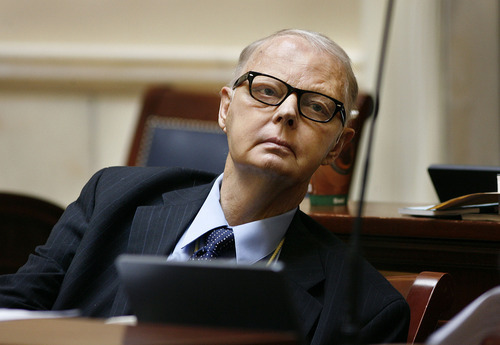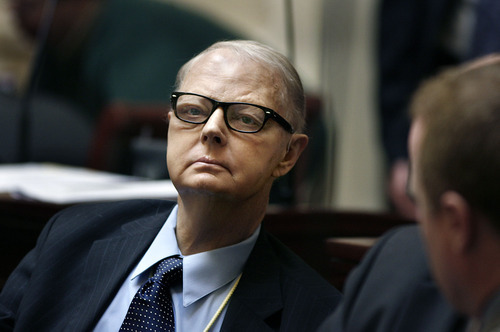This is an archived article that was published on sltrib.com in 2011, and information in the article may be outdated. It is provided only for personal research purposes and may not be reprinted.
Dennis Stowell enters the back of the Senate chamber slowly, almost shuffling to his desk.
His eyes seem sunken behind his black, horn-rimmed glasses and the once-angular features of his face have been obscured by swelling and puffiness from steroids he takes to help his body withstand radiation.
Stowell takes a small bite from a breakfast bar and sets it aside. He has good days, he says, and bad days. This happens to be a bad day. The cancer that began in his prostate has spread to his bones and causes severe back pain and fatigue.
Yet Stowell is determined to continue his work in the Senate.
"You've just got to do what you can do," the Republican from Parowan said. "We're going to stick it out. I'm sure I'll be fine through the session."
As vice chairman of the Utah Legislature's budget committee, the 66-year-old's biggest challenges may lie ahead, with grueling 14-hour days the norm in the closing weeks of the legislative session. Some colleagues worry about the toll it might take on his weakened body.
"He's knocking himself out," said Senate Majority Leader Scott Jenkins, R-Plain City. "At what cost? It scares the heck out of you."
Stowell left Capitol Hill early Friday to begin a new regimen of treatment just a few miles away. Doctors won't know until this week how effective it has been. He said Saturday, after having an MRI on his back, that he is optimistic it will work.
Stowell has a dozen bills he wants to get passed this session, several of which have already made it to the governor's desk. Plus, the constituents who re-elected him last November have encouraged him to forge ahead in representing the sprawling rural Utah district.
"When the cancer showed up kind of bad again, those rural county people said, 'Just keep going. You need to keep a-goin',' " he said. Stowell has been in the Senate since 2006.
He is still up by 5:30 or 6 in the morning and says he has made it to all of the budget and leadership meetings.
"You get all the rest you can on the weekend," Stowell said. "You get rested up … and then you hit it Monday morning and by Friday you're tired again."
His family has been behind him. Many of his seven children and 17 grandchildren live around Salt Lake City, allowing him to be close to his family and his work.
"I think it's a good thing to support both of them," Stowell said. "They're both behind me and encouraging me to keep going."
On most days, Stowell's son, Kelly, isn't far from his dad's side helping out where he can, meeting with constituents, shepherding bills, writing talking points or otherwise trying to take pressure off his father.
"It's extremely difficult to watch him go through that. He doesn't know quit. He's just a tough, tough guy, and it's remarkable to see what he's able to handle," said Kelly Stowell. "It's especially hard and I want to tell him to give it up on those bad days, but he keeps going, and the thing I see the most is he doesn't complain. He just goes to work and I think does a really good job representing our rural area of the state."
Stowell was first diagnosed with prostate cancer in 2003 when he was still an Iron County Commissioner.
It was the same diagnosis his father had received years earlier, and the same that all three of his brothers have been given.
Stowell's father was diagnosed when he was 72. He refused treatment and died of old age 20 years later. His brothers each responded differently. One has taken after their father and refused treatment.
Stowell had radiation implanted in his body, which beat back the cancer for years. Last June, Stowell said everything seemed fine. He was moving pipes on his farm and felt great.
But in July, doctors found that cancer cells had returned. He has undergone treatments every three weeks since. It was months before Stowell even told his colleagues he was ill, said Senate President Michael Waddoups.
It was only in the last two weeks, Stowell said, that he really began having problems.
The back pain is intense and the steroids meant to strengthen his system and help with the pain have taken a toll. Fatigue sets in and Stowell has had to leave the Capitol to rest.
"When he's rested and his energy level is up, he's better than three-fourths of us up here," said Waddoups, who plans to give his colleague breaks when he can and keep him fresh. "He's a great asset to us."
The cancer cells have changed their genetic makeup, explains Stowell, who spent his career as a chemical engineer, and have become resistant to the treatment.
"The doctors don't know. They can't say how you're going to be," Stowell said. "All we can do is wait and see."
Rep. Mike Noel, who represents much of the same region of the state as Stowell, has an idea what his colleague is going through. Three years ago, Noel, R-Kanab, underwent chemotherapy for prostate cancer during the legislative session, although his cancer was less advanced and the treatment less intensive.
"The radiation is terrible. … It takes a toll on you. It wears you out," said Noel, who nearly died from blood poisoning during his treatment. "He's is a tough old cowboy. We're all praying he beats it."





